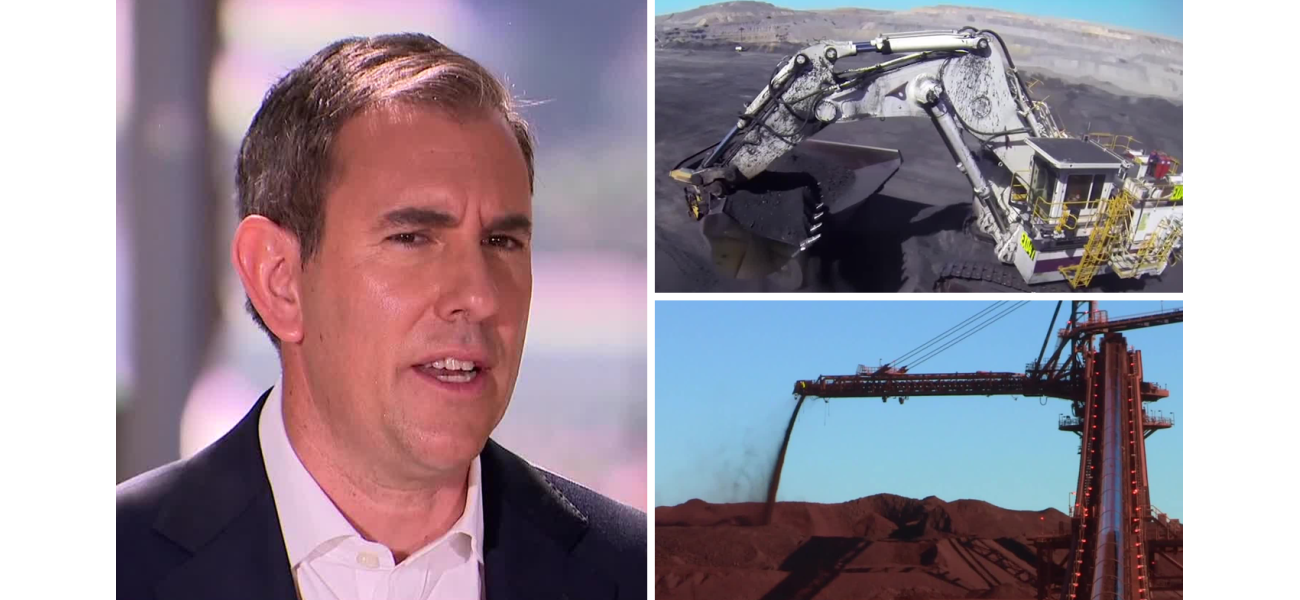Budget in danger as resources prices drop, leaving a $4.5 billion gap.
Australian treasurer Jim Chalmers will soon visit China for the first time since the pandemic, as both countries face economic struggles.
September 8th 2024.

In the midst of a struggling global economy, Jim Chalmers, the treasurer of Australia, is set to make a historic visit to China this month. He will be the first Australian treasurer to do so since the start of the pandemic. The timing of this visit is crucial as both countries are grappling with economic challenges.
As the prices of resources continue to plummet, Australian households are bracing themselves for the impact on their budgets. This has also been reflected in recent polls, which have shown ongoing difficulties for the government. The once-booming prices of resources have now become a double-edged sword, posing a threat to the budget rather than bolstering it.
Chalmers himself acknowledged this concerning issue, stating that the weakening of commodity prices has a direct impact on the economy and the budget. He specifically pointed to the decline in iron ore and coal prices, which is expected to result in a $4.5 billion loss for the budget. This serves as a reminder of the volatility and uncertainty in the global economy, which inevitably affects Australia's economy.
The release of this troubling financial news coincided with the latest polling results, which showed a tight race between the Labor and Coalition parties. While the opposition holds a significant lead in primary votes, a large portion of voters expressed their support for other parties. In terms of preferred prime minister, Anthony Albanese regained a slight lead over the current prime minister, but it was within the margin of error.
The poll also shed light on the issue of cost of living, with a majority of voters holding Labor responsible for addressing inflation rather than the Reserve Bank. Shadow Treasurer Angus Taylor criticized the government for not doing enough to combat inflation, arguing that it would have put the economy in a better position.
One of the main factors contributing to the decline in commodity prices is the slowdown in the Chinese housing market. This adds another layer of pressure for Chalmers during his upcoming visit, as he will be the first treasurer to enter China since 2017. Despite the complexities in the relationship between the two countries, Chalmers remains optimistic, highlighting the opportunities that the relationship holds.
Mining has long been the backbone of the Australian economy, but the current downturn has highlighted the need for diversification. This is where other industries, such as education, can play a significant role. Education Minister Jason Clare emphasized the value of international students, not just in terms of revenue, but also in building relationships between countries. However, with the recent decision to cap the number of foreign students, there will be a push to send them to regional areas in order to free up housing in cities.
This move is also seen as a way to return migration to pre-pandemic levels. According to Clare, if universities want to continue attracting international students, they will need to invest in building more housing. The fear is that if studying in Australia becomes too difficult, students and their money will go elsewhere.
In the face of economic challenges, it is clear that Australia needs to diversify and adapt. The upcoming visit to China by Jim Chalmers presents an opportunity to strengthen the relationship between the two countries and explore new avenues for growth. It is a delicate balancing act, but one that is necessary for the future of Australia's economy.
As the prices of resources continue to plummet, Australian households are bracing themselves for the impact on their budgets. This has also been reflected in recent polls, which have shown ongoing difficulties for the government. The once-booming prices of resources have now become a double-edged sword, posing a threat to the budget rather than bolstering it.
Chalmers himself acknowledged this concerning issue, stating that the weakening of commodity prices has a direct impact on the economy and the budget. He specifically pointed to the decline in iron ore and coal prices, which is expected to result in a $4.5 billion loss for the budget. This serves as a reminder of the volatility and uncertainty in the global economy, which inevitably affects Australia's economy.
The release of this troubling financial news coincided with the latest polling results, which showed a tight race between the Labor and Coalition parties. While the opposition holds a significant lead in primary votes, a large portion of voters expressed their support for other parties. In terms of preferred prime minister, Anthony Albanese regained a slight lead over the current prime minister, but it was within the margin of error.
The poll also shed light on the issue of cost of living, with a majority of voters holding Labor responsible for addressing inflation rather than the Reserve Bank. Shadow Treasurer Angus Taylor criticized the government for not doing enough to combat inflation, arguing that it would have put the economy in a better position.
One of the main factors contributing to the decline in commodity prices is the slowdown in the Chinese housing market. This adds another layer of pressure for Chalmers during his upcoming visit, as he will be the first treasurer to enter China since 2017. Despite the complexities in the relationship between the two countries, Chalmers remains optimistic, highlighting the opportunities that the relationship holds.
Mining has long been the backbone of the Australian economy, but the current downturn has highlighted the need for diversification. This is where other industries, such as education, can play a significant role. Education Minister Jason Clare emphasized the value of international students, not just in terms of revenue, but also in building relationships between countries. However, with the recent decision to cap the number of foreign students, there will be a push to send them to regional areas in order to free up housing in cities.
This move is also seen as a way to return migration to pre-pandemic levels. According to Clare, if universities want to continue attracting international students, they will need to invest in building more housing. The fear is that if studying in Australia becomes too difficult, students and their money will go elsewhere.
In the face of economic challenges, it is clear that Australia needs to diversify and adapt. The upcoming visit to China by Jim Chalmers presents an opportunity to strengthen the relationship between the two countries and explore new avenues for growth. It is a delicate balancing act, but one that is necessary for the future of Australia's economy.
[This article has been trending online recently and has been generated with AI. Your feed is customized.]
[Generative AI is experimental.]
0
0
Submit Comment





